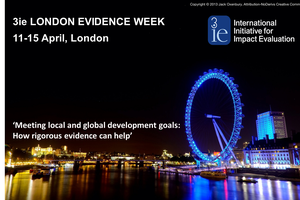Delving Deep into Data

In recent years there has been increasing interest in the role of data, evidence and research in international development. Donors, policymakers and practitioners alike are grappling with how best to incorporate the latest evidence and technological developments into their work, whilst communications professionals are continually innovating to convey data and research findings in creative and accessible ways.
In this context, last week I attended two fascinating events:
SMS in Development Research
Hosted by TNS Public Affairs and RTI International, this event included presentations and discussions on new research conducted in Kenya, Uganda, Nigeria and Ghana to compare SMS surveys with face-to-face approaches.
So what are the advantages of SMS surveys? DFID noted that they could be a useful tool to support the increased demand for high quality data generated by the Sustainable Development Goals and their indicators. SMS surveys can also lead to cost savings, being approximately USD $30 less per person surveyed than face to face approaches! Another key advantage of using SMS to gather evidence is the relative speed of the approach in comparison to conducting face to face surveys.
However, the research also found that SMS surveys do not generate a survey sample that it is as representative of the whole population as a face to face approach. The speakers explained that there are still some challenges to address around using SMS surveys, such as literacy and the digital divide, as well as technical challenges around different mobile phone networks. There are also different types of bias such as non-response bias which affect how representative the sample is. This means that the people who don’t respond may be different in some way from the people who do, suggesting that the data captured is not representative and may not be useful evidence.
Nevertheless, it was clear that SMS has progressed rapidly as a data collection tool and that further refinement could lead to exciting new approaches to collecting evidence for international development programmes.
Rigorous Evidence Helping Us Meet Development Goals
Hosted by 3ie, the Evidence Week offered an interesting series of workshops, presentations and discussions on how evidence can be used to help meet local and global development goals and influence policymakers.
I particularly enjoyed attending a session entitled ‘Education effectiveness and the SDGs: what we can learn from a new 3ie systematic review’ during which the challenges around how best to communicate key findings to non-specialists, particularly in cases where the length of an academic document such as a systematic review – in this case over 900 pages! – can be particularly off-putting, were discussed.
This is something SHARE, and the WASH sector as a whole, is all too aware of. Communicating research in a way that is accessible to policymakers is essential in order to influence evidence-based policy change. While there are no clear answers on how best to engage policymakers with research, SHARE develops accessible briefing notes, infographics, policy briefs, research reports and videos in order to disseminate new evidence and engage a range of stakeholders.
